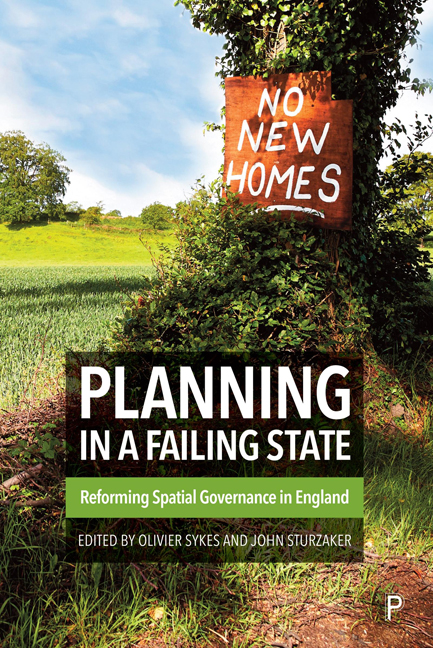Book contents
- Frontmatter
- Dedication
- Contents
- List of figures and tables
- Notes on contributors
- Acknowledgements
- 1 Introduction
- 2 The (housing) numbers game
- 3 Localism: the peccadillos of a panacea
- 4 Planning at the ‘larger than local’ scale: where next?
- 5 PD games: death comes to planning
- 6 Building beauty? Place and housing quality in the planning agenda
- 7 Zoning in or zoning out? Lessons from Europe
- 8 Planning and the environment in England, 2010–22: cutting ‘green crap’, Brexit and environmental crises
- 9 Stuck on infrastructure? Planning for the transformative effects of transport infrastructure
- 10 Conclusion
- Index
1 - Introduction
Published online by Cambridge University Press: 27 March 2024
- Frontmatter
- Dedication
- Contents
- List of figures and tables
- Notes on contributors
- Acknowledgements
- 1 Introduction
- 2 The (housing) numbers game
- 3 Localism: the peccadillos of a panacea
- 4 Planning at the ‘larger than local’ scale: where next?
- 5 PD games: death comes to planning
- 6 Building beauty? Place and housing quality in the planning agenda
- 7 Zoning in or zoning out? Lessons from Europe
- 8 Planning and the environment in England, 2010–22: cutting ‘green crap’, Brexit and environmental crises
- 9 Stuck on infrastructure? Planning for the transformative effects of transport infrastructure
- 10 Conclusion
- Index
Summary
Introduction
This book aims to contribute to reflection on the current state of planning on the island of Britain. More specifically, it brings together a collection of chapters from experts in different fields of planning to provide a review of the past decade or so of reforms of, and debates about, the planning system in England. The initial prompt for the book was the publication in 2020 of a White Paper, Planning for the Future (MHCLG, 2020). This was one of a series of governmental statements of intent and reform proposals for planning that have peppered the period since 2010. Since 2020, both the debate and governmental personnel have moved on. In 2022, the Levelling Up White Paper and the subsequent Levelling-up and Regeneration Bill were published as steps towards the enactment of the planning reform agenda. England has seen the departure of three secretaries of state with responsibility for planning – though one was subsequently reinstated – and the latest rebranding of the ‘home’ ministry for planning, which has changed from the Ministry of Housing, Communities & Local Government (MHCLG) to the Department for Levelling Up, Housing and Communities (DLUHC). Between the first draft of this book being submitted in August 2022 and its publication, the UK has also had three prime ministers. The reflections in the book and proposals for planning reform have taken place against this background of wider political churn and policy flux. As well as reflecting on planning reform and performance since 2010, the authors have therefore been asked to consider how far the planning proposals in the Levelling-up and Regeneration Bill differ from those that were floated in the Planning White Paper of 2020, and whether and to what extent, if applied, the proposals in the Levelling-up and Regeneration Bill might result in a change in current planning practices and outcomes.
The title of the book, Planning in a Failing State, uses the different meanings and usages of the term and noun ‘state’ as a means of framing its reflections on ‘the state of planning’ and ‘the state planning is in’. The word ‘state’ can refer to ‘a condition or way of being that exists at a particular time’.
- Type
- Chapter
- Information
- Planning in a Failing StateReforming Spatial Governance in England, pp. 1 - 18Publisher: Bristol University PressPrint publication year: 2023

